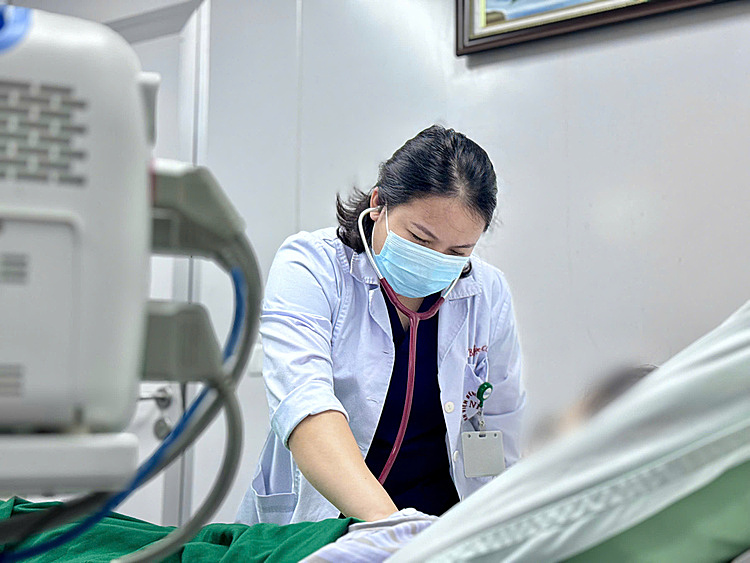On 16/8, a representative from the National Hospital of Tropical Diseases reported that the patient's symptoms rapidly worsened within three days. Despite taking antipyretics, her fever only subsided for 2-3 hours before returning. She received treatment at a private clinic, but her condition didn't improve.
Upon admission to the hospital, the pregnant woman exhibited progressive respiratory distress, rapid shallow breathing, and the use of accessory respiratory muscles. Her SpO2 (blood oxygen saturation) was only 77-80% (normal range: 96-100%), indicating severe hypoxemia, posing a danger to both mother and fetus. After receiving oxygen via nasal cannula, her SpO2 improved to 95-96%, temporarily meeting her oxygen needs. However, her respiratory condition continued to deteriorate, requiring non-invasive ventilation.
A CT scan of her lungs revealed extensive bilateral damage, consolidation, and multiple small, miliary nodules. Doctors diagnosed her with pulmonary tuberculosis, requiring intensive treatment.
 |
Doctors treating the patient. Photo: Hospital provided |
Doctors treating the patient. Photo: Hospital provided
Pulmonary tuberculosis during pregnancy is extremely dangerous, according to Dr. Ninh Thi Ngoc from the Emergency Department. In addition to the risk of acute respiratory failure and permanent pulmonary fibrosis, the disease requires medication. Some tuberculosis medications carry high toxicity, and if the dosage and regimen are not adjusted appropriately, they can cause birth defects or have long-term effects on the child's development, especially during the first trimester.
Tuberculosis can exist silently in a latent form, without noticeable symptoms. During pregnancy, especially with IVF, the immune system changes, coupled with psychological stress, making it easier for latent tuberculosis to become active. The disease can progress rapidly in just a few days.
Doctors confirmed that the patient arrived at the hospital in time and received appropriate treatment. Any delay could have been life-threatening for both mother and child.
Experts recommend tuberculosis screening before undergoing IVF. This is crucial to prevent transmission from mother to child and protect the mother's health. Women planning to become pregnant, especially before IVF, should undergo a general health check and be screened for infectious diseases, including tuberculosis. Vaccinations against tetanus, rubella, influenza, chickenpox, and hepatitis B are also recommended to reduce the risk of miscarriage, premature birth, or birth defects. During pregnancy, if a woman experiences persistent fever, cough, shortness of breath, or fatigue, she should immediately seek care at a reputable medical facility for diagnosis and timely treatment.
Thuy Quynh












